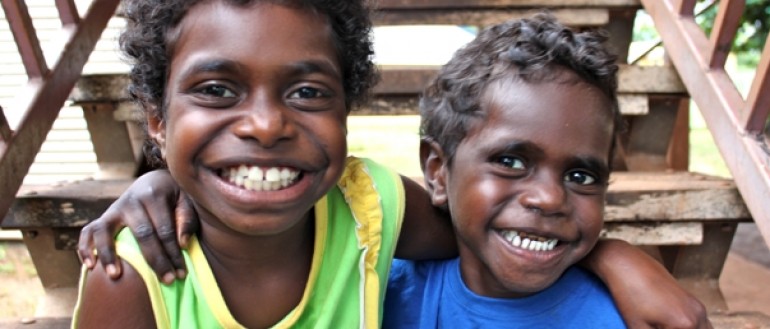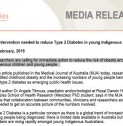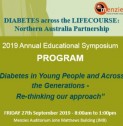Aim:
- To advance our understanding of the impact of diabetes and related metabolic disorders on the development of heart disease and early death in urban Indigenous Australians.
Objectives:
- To follow-up the Darwin Region Urban Indigenous Diabetes (DRUID) study, an Indigenous health survey on diabetes and heart disease.
- To advance our understanding of the impact of non-traditional heart disease risk factors (e.g. blood fats and sugar, and kidney disease) in the development of heart disease in Indigenous Australians.
- To address the gaps in our knowledge of heart disease risk in an urban Indigenous population.
- To play an important capacity building role with Indigenous staff and collaborators involved in the research process.
- To develop clinical tools to improve the identification of Indigenous people at high risk of heart disease.
- To form important partnerships/collaborations between the study investigators and the Indigenous community through the Indigenous Steering Group who will be involved in helping to translate the study findings into the clinical and public health settings.
Summary:
- The DRUID study is a cohort study investigating the incidence of diabetes, heart disease, stroke, kidney disease and related conditions. This study has improved our understanding of the complex links that exist between diabetes and diabetes related metabolic risk factors in the development of cardiovascular disease in Indigenous Australians.
- Since DRUID is the largest cohort of urban Indigenous Australian adults undertaken so far, this study helps to address the current gaps in the literature of cardiovascular disease risk in an urban Indigenous population, as most research on cardiovascular disease risk has focused on remote populations.
- This knowledge informs both type 2 diabetes and cardiovascular disease risk factor assessment. More accurate risk assessment of type 2 diabetes and cardiovascular disease in primary care will improve early detection of these diseases in individuals from high risk populations, thereby optimising treatment and enhancing clinical outcomes.
Implications for policy and practice:
- This study will inform both diabetes and heart disease risk factor assessment. Public health initiatives that aim to prevent and better manage diabetes and renal disease could help to prevent cardiovascular disease in Indigenous Australians.
Our research has found:
- That nearly a third of cardiovascular disease events in the DRUID study population were attributable to diabetes and 21 per cent were attributable to albuminuria - a marker of kidney disease.
- Highlights the importance for people to visit their health clinic or doctor and have tests for blood sugar and urine tests for kidney disease in addition to tests for blood fats and blood pressure.
Chief investigators:
Contact information:
Project dates:
Completed.
Funders:
- National Health and Medical Research Council (NHMRC)
- Diabetes Australian Research Trust (DART)
- Northern Territory Research and Innovation Board Grant
- Northern Territory Department of Health
Collaborators:
- Prof Louise Maple-Brown (Menzies)
- Prof Joan Cunningham (Menzies)
- Mr Shawn Tatipata (Chair DRUID Indigenous Steering Group)
- A/Prof Terry Dunbar (CDU and The University of Adelaide)
- Dr Nadarjah Kangaharan (Royal Darwin Hospital)
- Dr Steven Guthridge (NT Dept Health)
- Ms Shu Qin Li (NT Dept Health)
- Prof John Condon (Menzies)
- Prof Kerin O’Dea (University of South Australia, The University of Melbourne)
- Prof Jonathan Shaw (Baker Heart and Diabetes Institute)
- DRUID Indigenous Steering Group
-

Jessica Mauboy sings out to end Indigenous diabetes and heart disease epidemic
Singer Jessica Mauboy is calling for Darwin-based Aboriginal and Torres Strait Islander people to complete a quick survey as part of the Diabetes and Related Conditions in Urban Indigenous People in the Darwin Region (DRUID) study, a ground-breaking diabetes and heart disease study.
-
Intervention needed to reduce Type 2 Diabetes in young Indigenous Australians
Researchers are calling for immediate action to reduce the risk of obesity and diabetes in Indigenous children and young people.
-
Metformin appears safe in treating hyperglycemia during pregnancy
Among indigenous and nonindigenous women in Australia, the use of metformin in treating hyperglycemic conditions during pregnancy, does not lead to serious adverse events.
-
Media Alert | Health experts in Darwin to discuss diabetes in pregnancy
Menzies - Diabetes across the Lifecourse: Northern Australia Partnership – Annual Educational Symposium on Friday, 27 September.
-

Mix 104.9 | Diabetes Symposium in Darwin
This is the seventh annual gathering of diabetes researchers, health workers and stakeholders to discuss a ‘lifecourse approach’ to preventing and managing diabetes.
-

NT News | Diabetes given centre stage
Menzies School of Health Research will host diabetes experts and health professional from across Northern Australia.
-
In remote communities, where more health workers are needed, chronic disease is rising
The community's battle is an example of what Menzies diabetes researcher Louise Maple-Brown says is a growing problem in the Northern Territory.
-
Diabetes in poverty-stricken pregnant women in the NT, highest in the world
Researcher and lead author Dr Matthew Hare said, for these women, poverty stricken and living in some of the most isolated regions of Australia, fresh and healthy food is often not for sale where they live or it is unaffordable.
- Cunningham, J., O’Dea, K., Dunbar, T., Weeramanthri, T., Zimmet, P., & Shaw, J. (2006). Study Protocol – Diabetes and related conditions in urban Indigenous people in the Darwin, Australia region: aims, methods and participation in the DRUID Study. BMC Public Health, 6(8).
- Cunningham, J. (2006). Diversity of primary health care providers for urban Indigenous Australians. (Research letter). Australian and New Zealand Journal of Public Health, 30(6), 580-581.
- Maple-Brown, L., Cunningham, J., Celermajer, D.S., & O’Dea, K. (2007). Increased carotid intima-media thickness in remote and urban Indigenous Australians: impact of diabetes and components of the metabolic syndrome. Clinical Endocrinology, 66(3), 419-425.
- Cunningham, J., & Dunbar, T. (2007). Consent for long-term blood samples by Indigenous Australian research participants: the DRUID Study experience. Epidemiologic Perspectives & Innovations, 4(7).
- Cunningham, J., O’Dea, K., Dunbar, T., Weeramanthri, T., Shaw, J., & Zimmet, P. (2008). Socioeconomic status and diabetes among urban Indigenous Australians aged 15-64 in the DRUID Study. Ethnicity & Health, 13(1), 23-37.
- Maple-Brown, L., Cunningham, J., Dunne, K., Whitbread, C., Howard, D., Weeramanthri, T., et al. (2008). Complications of diabetes in urban Indigenous Australians: the DRUID Study. Diabetes Research and Clinical Practice, 80(3), 455-462.
- O’Dea, K., Cunningham, J., Maple-Brown, L., Weeramanthi, T., Shaw, J., Dunbar, T., & Zimmet, P. (2008). Diabetes and cardiovascular risk in urban Indigenous Australians: Results from the DRUID Study. Diabetes Research and Clinical Practice, 80(3), 483-489.
- Cunningham, J., O’Dea, K., Dunbar, T., & Maple-Brown, L. (2008). Perceived weight versus body mass index among urban Aboriginal Australians: Do perceptions and measurements match? Australian and New Zealand Journal of Public Health, 32(2),135-138.
- Paradies, Y.C., & Cunningham, J. (2008). Development and validation of the Measure of Indigenous Racism Experiences (MIRE). International Journal for Equity in Health, 7(9).
- Maple-Brown, L.J., Cunningham, J., Barry, R.E., Leysley, L., O’Rourke, M.F., Celermajer, D.S., & O’Dea, K. (2009). Impact of dyslipidaemia on arterial structure and function in urban Indigenous Australians. Atherosclerosis, 202(1), 248-254.






